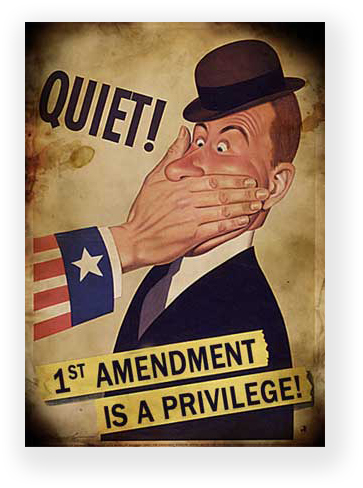We’re still doing a weekly newsletter … we’re just posting pieces of it every day. The news is fresher this way …
YOU MAY BE GOING TO HELL, BUT YOU’VE STILL GOT RIGHTS
 The story initially appears to be pretty seamy: Kevin Williams, who is serving a 65‐year Illinois sentence for murder, ordered the death certificate of the woman he killed from the county clerks office. The clerk didn’t much like the request, so she sent him the death certificate with a note saying “there is a place in hell waiting for you as you must know you will reap what you have sowed!”
The story initially appears to be pretty seamy: Kevin Williams, who is serving a 65‐year Illinois sentence for murder, ordered the death certificate of the woman he killed from the county clerks office. The clerk didn’t much like the request, so she sent him the death certificate with a note saying “there is a place in hell waiting for you as you must know you will reap what you have sowed!”
The prison refused to let Kevin have the death certificate (and the note, but he probably didn’t want that) on the grounds that “it posed a threat to the safety and security of the institution and would negatively impact Inmate Williams’ rehabilitation.”
Kevin sued the prison officials in federal court, contending that by confiscating the certificate without even giving him a chance to read it, prison officials had infringed his 1st Amendment rights. The district court judge granted summary judgment for the prison staff on the grounds that their confiscating the certificate had Kevin, and also had protected the victim’s family because the death certificate might include information identifying siblings, spouses or parents.
This week, the 7th Circuit reversed. In a short but to-the-point decision, the Court of Appeals observed that a prison can confiscate an inmate’s mail if confiscation is reasonably related to legitimate penological interests. But the prison must present “some evidence to show that the restriction is justified.” The prison officials argued that the “place in hell” accompanying the certificate threatened violence against Kevin. The Court dryly agreed, but noted that the violence threatened was “violence in hell, not in the prison; no prison official suggested that the note portended violence in the prison.” The officials also argued that Kevin “could use the death certificate as a ‘trophy’ which would increase tension within the prison and decrease his chances for rehabilitation.” But the officials cited no evidence that he intended to do so.
Indeed, Kevin explained in both an affidavit and a deposition that he had ordered the death certificate for use in state post–conviction proceedings rather than to save as a trophy of his crime, and “the defendants have presented no contrary evidence to support their assumption that Williams wanted a trophy.” In fact, the Court said, “the prison could have avoided this controversy in the first place by holding on to the death certificate except for the short time needed to include it (or indeed just a xerox copy of it) in Williams’ court filing.”
 The 7th held that the right of a prison inmate to read the mail he receives, provided that his reading it would not infringe the prison’s legitimate interests, is clearly established. A prison does have a legitimate safety concern about things like “boasting inmates” carrying around trophies of their victims and violence. But in order to defeat the 1st Amendment right of prisoners, such concerns have to be supported by evidence, not just the prison officials’ say-so.
The 7th held that the right of a prison inmate to read the mail he receives, provided that his reading it would not infringe the prison’s legitimate interests, is clearly established. A prison does have a legitimate safety concern about things like “boasting inmates” carrying around trophies of their victims and violence. But in order to defeat the 1st Amendment right of prisoners, such concerns have to be supported by evidence, not just the prison officials’ say-so.
Williams v. Hansen, Case No. 15‐2236 (7th Cir. Sept. 20, 2016)

